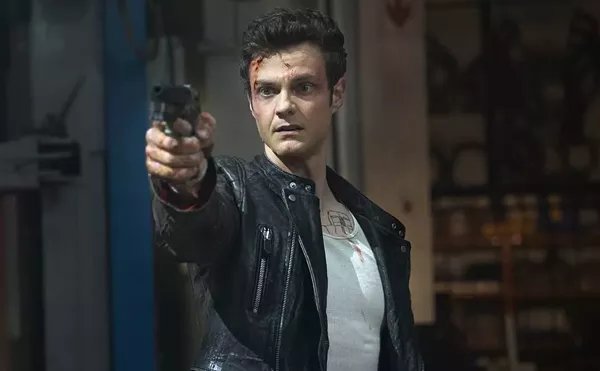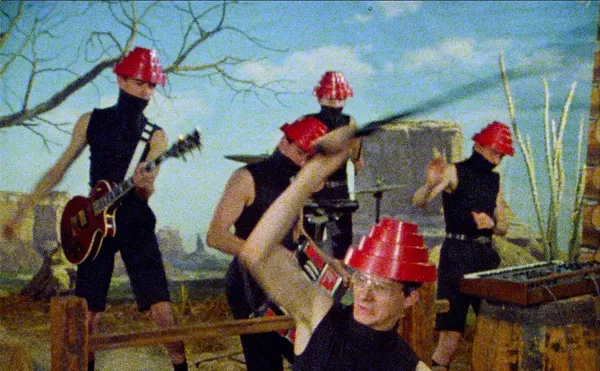While graphic novels have become the new wellspring for Hollywood blockbusters, most have yielded technically impressive but emotionally sterile sagas. The flamboyant adaptations of Sin City, 300, and V for Vendetta radiate style and wit but rarely win affection for their all-too cool characters. More ordeal and spectacle than story, they simultaneously amaze and disappoint.
In adapting Neil Gaiman's lovely graphic novel Stardust, British director Matthew Vaughn (Layer Cake) hoped to deliver a fable filled with epic romance, understated comedy and emotional thrills. Unfortunately his inventive but chaotic translation has merely replaced Gaiman's delicate and whimsical wordplay with episodic and cluttered storytelling.
A throwback to kinder, gentler genre efforts like Willow, Legend and Labyrinth, Vaughn and his co-writer Jane Goldman fail to do the one thing expected of fantasy: create a credible and compelling world. Unlike Middle Earth, Narnia or Oz, Stardust's Stormhold is about as authentic as the local Renaissance Fair. Populated with unicorns, witches, sky pirates and evil princes, the fantastical elements feel manufactured and slapped together, like a CliffsNotes primer on fairy-tale legend.
Essentially a chase picture, Stardust is the tale of a young man named Tristan (the blandly handsome Charlie Cox), who struggles against dangerous perils in his quest to fetch a fallen star — which is the deepest desire of his true love, Victoria (Sienna Miller). Venturing deep into the land of Stormhold, Tristan discovers that the star, knocked from the heavens, is actually a girl named Yvaine (Claire Danes). Worse, a trio of witches (led by Michelle Pfeiffer) and two murderous princes keen to gain control of the throne also desire the radiant Yvaine. Fleeing from one fantastical setting to the next, the pair encounters opportunistic foes and oddball allies all while falling in love. (See Robert De Niro's Captain Shakespeare, a ferocious lightning pirate who, behind closed doors, is a cross-dressing nancy boy.)
While all the trappings of a solid fantasy are here — true love, mystical creatures, arcane magic and court intrigue — Tristan and Yvaine's adventure is never properly motivated. Instead, the budding lovers follow a path laid out by the book rather than personal desire or necessity. And without a driving narrative, the movie presents three or four different climaxes, none of which is particularly creative.
Vaughn lacks the artistic voice necessary to express his ideas and shape the material into something. Whereas the cool but jaunty Layer Cake directly emulated the work of his mentor Guy Ritchie, Stardust suffers from a cinematic identity crisis. Vaughn shuffles from one sensibility to the next, channeling the absurd whimsy of Terry Gilliam one minute only to switch to earnest sentiment the next. The comedy is hit-or-miss and the special effects are sufficient, but hardly impressive.
Inevitably, comparisons will be made to The Princess Bride — and there are similarly subversive moments sprinkled throughout Stardust — but Vaughn's film isn't nearly as playful, clever or satirical as Rob Reiner's cult hit. It boasts a greater sense of sweep and style but its predictable storyline mistakes mawkishness for emotional resonance.
If the film has one thing going for it, it's the high-spiritedness of its supporting players. From Peter O'Toole's dying king to the scheming manipulations of ruthless Prince Septimus (Mark Strong) to De Niro's campy but oddly sympathetic transvestite pirate to Michelle Pfeiffer's deliciously wicked witch, each member of the cast (except its two leads) is having a blast. Blink twice and you'll miss cameos from the Lock, Stock, and Two Smoking Barrels cast.
Predictable but not without charm, Stardust offers alternatives to audiences tired of the lopped-off limbs, lusty battle cries and brooding heroes of Peter Jackson's Lord of the Rings films.
Jeff Meyers writes about film for Metro Times. Send comments to [email protected].






